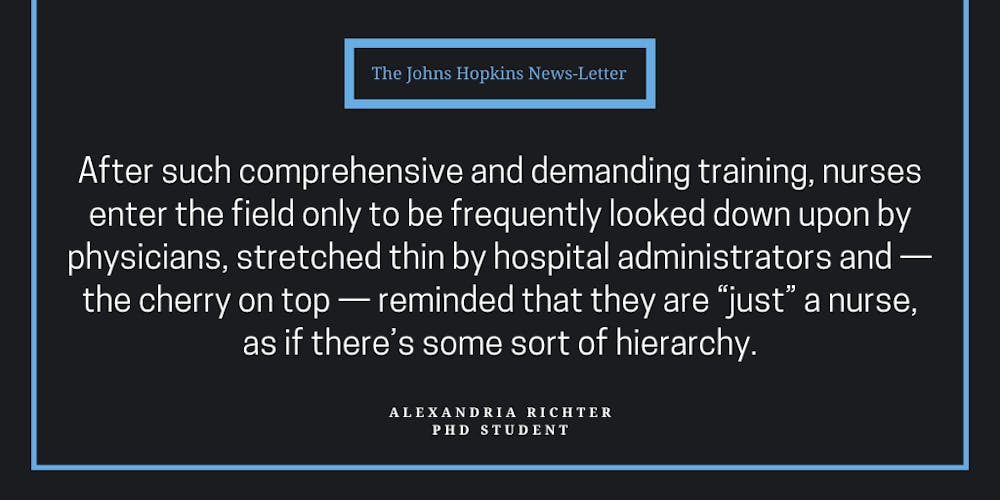“I am just a nurse.”
These are the words my professors had me swear by oath to never speak during my first day of nursing school. I have never uttered these words because I have never believed them. I’ve always respected the nursing profession and, in general, disagree entirely with devaluing a much-needed component of a functioning society.
Yet, as a registered nurse who is no longer working in the nursing profession, I ironically find these five words looming over me more than they ever did when I was, in fact, a practicing registered nurse (RN). This is not because my new line of work in the field of food security and nutrition is overly challenging nor because I feel I do not belong. My Bachelor of Science in Nursing, Master of Public Health and Master of Art in Food Security have prepared me well for my current field of work and study.
But when I disclose that I received my Bachelor of Science in Nursing (and that I used to be an RN), I watch myself, through the eyes of many, become devalued in a matter of seconds.
I have gathered that the disrespect nurses often face in the clinical setting — ranging from deliberate, unsafe understaffing by administration to physical or verbal abuse by patients — is a byproduct of the widespread depreciation of the nursing profession.
My personal experience with this devaluation outside the field has included comments made directly to me such as, “You’re pretty good at this [my statistics course] for a nurse,” and comments I have overheard like, “You realize she is just a nurse, right?” My work experience as a nurse was deemed “inapplicable” to the many roles I applied for outside of the nursing profession. I’ve faced a myriad of obstacles since graduating, as I advocated for myself and my nursing background in job interviews.
Despite graduating with honors from master’s programs in the same disciplines as the jobs I applied for, I was met with questions about my competency because I am a nurse.
If the word “nurse” had been replaced with a different clinical profession — let’s say “doctor” for example — I am convinced that the same devaluation would not have occurred.
Part of the issue in many situations of devaluation is ignorance. So for anyone who is unfamiliar with what exactly a Bachelor of Science in Nursing entails, let me shed some light on the experience.
It is a fast-paced, rigorous program. The first two years involve what are often referred to as “weed out courses” for all students pursuing science disciplines, which include classes such as zoology, microbiology, biochemistry, anatomy, physiology, nutrition, as well as a variety of theory courses pertaining to the social determinants of health.
In my anatomy and physiology course, I had the opportunity to dissect a human cadaver, which is commonly known as an essential part of medical school education — lesser known as a part of nursing preparation.
After the first two years, you must then apply to be accepted into the second two years, formally known as “nursing school,” during which you learn about the pathology and pathophysiology of just about every communicable and non-communicable disease out there. You also learn about every single drug class, potential side effects and how they interact with specific disease pathologies.
After such comprehensive and demanding training, nurses enter the field only to be frequently looked down upon by physicians, stretched thin by hospital administrators and — the cherry on top — reminded that they are “just” a nurse as if there’s some sort of hierarchy.
If it wasn’t noticed before the COVID-19 pandemic, anyone with eyes can now see the vital role that nurses play. It is nurses who stay at the bedside for 12-plus hours straight, nurses who implement technical tasks, nurses who spend time getting to know patients closely — allowing them to identify pertinent changes in patients’ conditions that may be overlooked in the quick rounds made by other clinicians.
We are experiencing a nursing shortage. which will only continue until we begin to address and change the devaluation of the profession inside and outside of the clinical setting.
I left the profession initially because my interest was piqued by the social determinants of health. I decided to further my studies to work on a high enough level to create real change in health and food systems through the influence of policy and scientific discovery.
I did so in a way that is not dissimilar to how, say, a doctor might leave their profession to study and work in a broader capacity. The difference is that, while doctors might receive the occasional question on why or how their interests may have evolved, I don’t think people would question their ability to succeed in their new field of work and they certainly wouldn’t be seen as a risk because of their degree.
As I begin my doctorate at Hopkins, I am met with a breath of fresh air to see that my interdisciplinary and multifaceted academic and professional background is entirely valued here. Perhaps that is for a reason.
I am proud of those two letters after my name, and I always will be. To anyone who is still not convinced and continues to hold disparaging beliefs about nurses, professional nursing work experience and the capabilities of nurses to succeed inside and outside of the profession: I challenge you to pursue a Bachelor of Science in Nursing.
Alexandria Richter is a graduate student from New York, N.Y. pursuing a doctorate in Health, Behavior and Society with a focus on food security. She works at the United Nations Food and Agriculture Organization.





